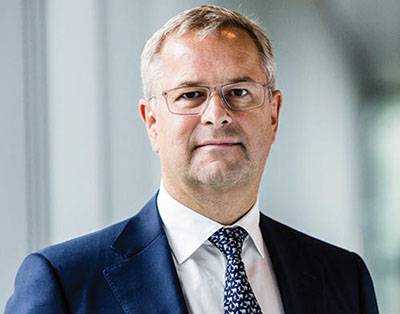Foreign trade boom offers high tide for Maersk Line

Soren Skou, CEO of Maersk Line and member of Excecutive Board of Maersk Group
Could you shed some light on the major difficulties confronting the shipping industry in Vietnam?
As a developing country, the major challenge for Vietnam is the lack of a qualitative infrastructure to fuel deep sea shipping, especially following the initial investment wave in the mid-2000s. Realising this demand, our group has invested in the deep-sea ports in Cai Mep- Thi Vai area in Ba Ria-Vung Tau province, hoping that the new infrastructure would help solve a host of other problems confronting the sector. However, the current utilisation rate at the Cai Mep International Terminal (CMIT) is just over 30 per cent, due to some challenges in road infrastructure and the slow progress in closing down ports in inner Ho Chi Minh City. This is compounded by the ports in Ho Chi Minh City having to deal with periodic congestion as they can only service small-sized vessels. This is unsustainable and has a huge impact on the shipping lines as well as on the importers and exporters.
Along with the deficient infrastructure, Vietnam has been grappling with expensive port charges and other associated logistics expenses, which altogether make a vessel call in Vietnam cost more than the neighbouring countries.
Do you think that Vietnam’s stable economic growth, combined with its pro-growth policies is the welcome news the shipping industry has been waiting for?
In 2014, the government offered many tax incentives for foreign investors as well as measures to simplify and reform tax administrative procedures. We certainly agree that these efforts will reduce the time spent on paying taxes and will lower production costs, thus further promoting Vietnam to the global investment community.
A succession of free trade agreements and WTO membership have meant importers and exporters in Vietnam have benefited from international good practice such as the e-customs system. Automating systems and transactions are crucial to improving productivity, accuracy, transparency, visibility of data and reducing costs. The system will help Vietnam to facilitate global trade and make the country more attractive to foreign investors, leading to a higher imports and exports volume. Maersk Line has pioneered the use of e-commerce in the shipping industry and is committed to support the government to successfully implement the system.
So, to answer your question, in line with the blooming economy, the pro-growth policies have been a positive sign for the shipping industry and Maersk Line in particular. Our primary goal is to expand our vessel capacity to meet the soaring demand.
As the recent free trade agreements can create more trade opportunities for Vietnam, how will Maersk Line cope with the rising competition?
Yes, the competition could be tough since a lot of efforts have been made to lower the barriers for importers and exporters, and shipping companies will eventually enter the market. However, we are very optimistic about our long-term development in Vietnam as Maersk Line is still leading the market. The company has been here for 23 years, and has a pool of experienced employees who understand the market, shipping seasonality, and the needs of local customers. Our annual volume growth rates have reached an average of 10 per cent since 2011. Independent maritime analysts such as Drewry also have consistently rated us as the most reliable carrier globally.
We will certainly continue to expand our network in Vietnam in line with the market demand and add more value to our services in terms of flexibility, frequency, reliability and especially our online platform. Maersk Line has implemented a variety of online functionalities for customers to reduce the time spent on doing business with us. For example, our local customers can make a booking on our website and receive booking confirmation within just eight minutes.
What do you think about the prospects of the shipping sector in Vietnam?
We see terrific potential in Vietnam’s shipping sector with strong interest from foreign investors, especially after the Trans-Pacific Partnership and Vietnam–EU Free Trade Agreement are signed. At a regional level, trade between Vietnam and Asia continues to multiply at a faster pace than the global average, with many mega-projects being implemented in the country by Korean and Japanese counterparts. Besides Asia, Vietnam mainly relies on the US and European markets. Over the past two years, growth in trade with the US has grown 10 per cent and export volumes to Europe increased 8 per cent annually. With continued stable economic growth, Vietnam is one of the fastest growing markets for the shipping industry in the region.
What the stars mean:
★ Poor ★ ★ Promising ★★★ Good ★★★★ Very good ★★★★★ Exceptional
Latest News
More News
- Hermes joins Long Thanh cargo terminal development (February 04, 2026 | 15:59)
- SCG enhances production and distribution in Vietnam (February 04, 2026 | 08:00)
- UNIVACCO strengthens Asia expansion with Vietnam facility (February 03, 2026 | 08:00)
- Cai Mep Ha Port project wins approval with $1.95bn investment (February 02, 2026 | 16:17)
- Repositioning Vietnam in Asia’s manufacturing race (February 02, 2026 | 16:00)
- Manufacturing growth remains solid in early 2026 (February 02, 2026 | 15:28)
- Navigating venture capital trends across the continent (February 02, 2026 | 14:00)
- Motivations to achieve high growth (February 02, 2026 | 11:00)
- Capacity and regulations among British areas of expertise in IFCs (February 02, 2026 | 09:09)
- Transition underway in German investment across Vietnam (February 02, 2026 | 08:00)
















 Mobile Version
Mobile Version